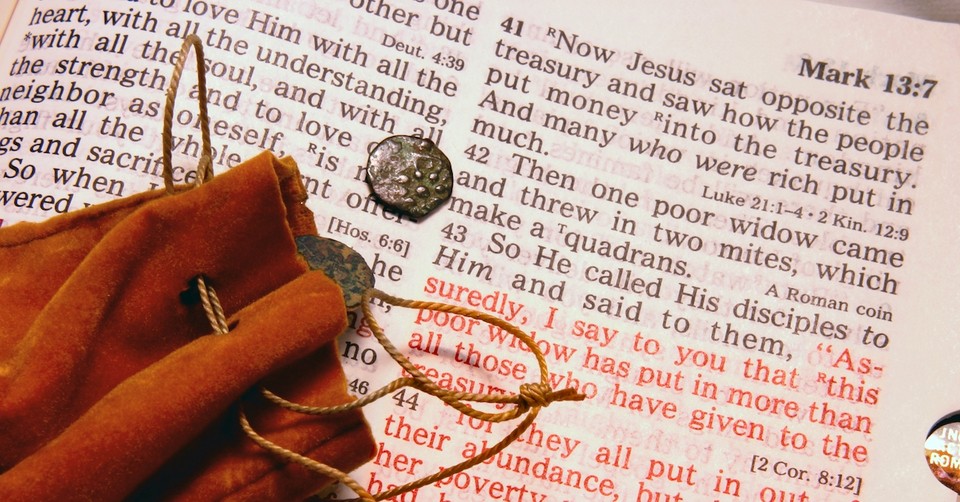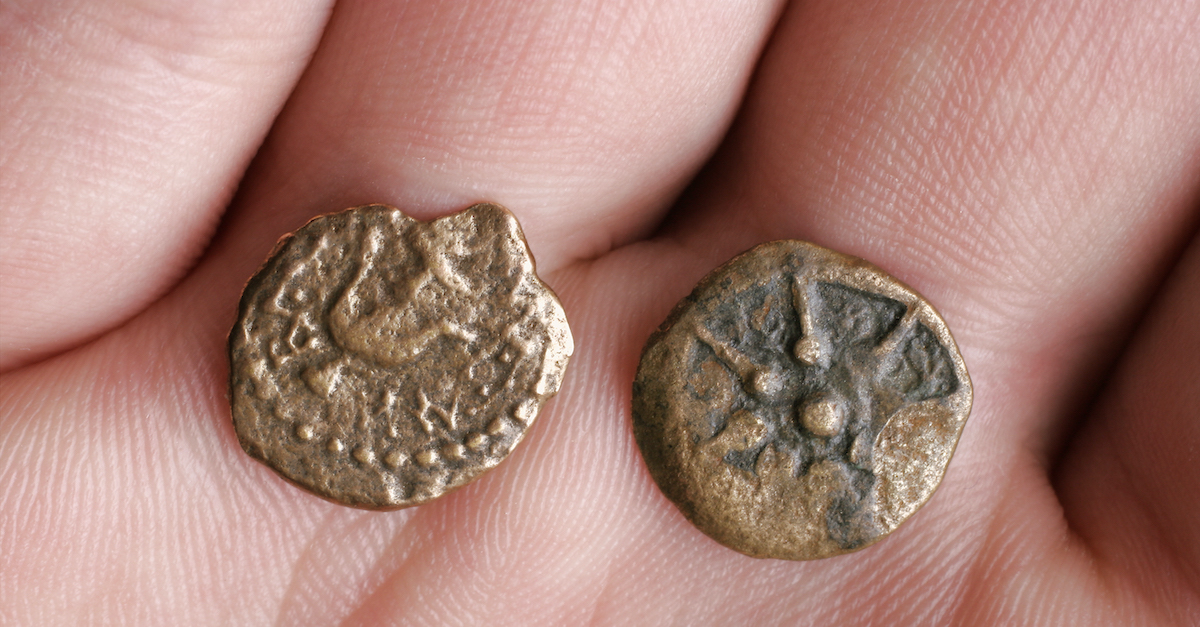3 Helpful Challenges in the Story of the Widow's Mite

Time and again, Jesus praises the faithfulness of those considered outside the realm of religious respectability. He praises the faithfulness of a Roman centurion, for example, and celebrates the saving faith of the “sinful woman” who poured perfume over his feet; the daughter of the Syrophoenician woman is also healed due to her mother’s bold and radical trust. The faithfulness of these religious vagabonds stands in direct contrast to the hypocrisy of the Temple elite. True faithfulness, Jesus observed, was rarely met in the cloistered halls of Temple holiness. Instead, honest faith could be seen in the lives of ordinary men and women clinging to the promises of God amidst life’s difficulties. The account of the “Widow’s Mite” is another one of these instances (Mark 12:41-44, Luke 21:1-4).
Jesus and his disciples sit opposite the Temple treasury. Jesus had just finished teaching his disciples about the dangers of a pharisaical way of faith – a faith that focuses only on the execution of rules. During this lesson, Jesus observes a widow making her financial offering to the Temple. The woman offers two small copper coins, the smallest of all coins in circulation. The value of the coins barely exceeds one penny. Astoundingly, Jesus comments that her small act counts more than the offerings of all the rich. (Luke 21:1-4)
As followers of Jesus in our own day, what lesson do we glean from the widow’s offering? Is this a lesson on the spirituality of giving? Is Jesus happy that she gave “all that she had to live on” to the Temple coffers? Is there more going on?
The story of the widow’s offering is not a stand-alone piece of Scripture. The four verses dedicated to this event are linked to the surrounding verses. Immediately prior to this passage, we read Jesus’ critique of the pharisaical way of faith; immediately following, we hear Jesus speak about the destruction of the Temple. Each part of the larger narrative helps us hear the challenge of the widow’s offering.
The widow’s offering provides three important challenges to our faith today:
What Is the Meaning of a Widow's Mite?
Lesson 1 from the Widow’s Mite: Bigger is not better.
The treasury was the place where faithful Jews would donate money in aid of Temple ministry and upkeep. As Jesus and his disciples sat opposite the treasury they saw many people come and make donations. In fact, Jesus highlights the widow’s offering in distinction from those that occurred before hers. “All others,” Jesus says, “gave out of their abundance.” For those with means, even a small donation would vastly outweigh the one penny offering of this poor widow. Yet it is the widow’s offering that is praised.
This widow offers her gift in a different spirit than that of the Pharisees and scribes. These, Jesus says, love to be seen by others. Their grand displays of religiosity, which undoubtedly included large donations to the Temple, were designed only for self-promotion. This widow, however, comes on the scene silently. Without fanfare or recognition, she makes her offering to the God she adores and longs for. Her offering, as small as it is, represents the fullness of a heart dedicated to God.
Big displays of spiritual fervor or religious zeal can get in the way of true, honest faith. Dwelling on the need for excellence in our worship, grand displays of faith, or pristine perfection in our prayers, simply masks our self-righteousness. A spiritual life that states that bigger is better twists the faith into an endless pursuit of self-focused glory. Instead of offering praise to the Lord, we long to elicit praise from our peers. True expressions of faith ought to be simple, humble, even small. In this way, we take our attention off ourselves and place it solely on the Lord. This is the challenge displayed in the widow’s offering.
What Did Jesus Say about the Widow's Mite?
Lesson 2 from the Widow’s Mite: The Lord looks at the heart.
It can be easy to turn acts of grace into rules to follow or laws to heed. Thus, it may be tempting to read the account of the widow and perceive some divine loophole through which we can earn our spiritual perfection. If the widow is praised for giving “all that she had to live on,” this obviously means that we must give away all we have to earn our full heavenly rewards! Right? Wrong.
When the widow makes her offering, Jesus does not praise her for the amount offered. Never once does Jesus say, “look how much she has put in!” Nor does Jesus delve into a lengthy description of proportional giving. What he does comment on is how, in her giving, she pledges her very self. There is no indication in the text that this widow is anything less than faithful in her offering. Her act of giving is not a financial act, but a casting of her very self on the grace of God.
Jesus contrasts the widow’s faithfulness with the self-righteous spirituality of the Pharisees and scribes. For them, acts of faithfulness were manipulated into tools for self-promotion. There was a frivolity to their life with God. Their eye was set solely upon themselves; the more they were observed acting righteously, the more respect they would garner among other people. Thus, they would give out of their abundance for the sole purpose of being seen by others. Sure, the dollar amount given may have been impressive, yet the indication is that such giving was nothing more than a financial transaction. Offering money is not the same as offering the self.
There is a danger in making our gifts a matter of what is leftover in our lives. To do this is to make our faith something we simply tack onto our already over-filled life. God does not receive the best of us, simply that which remains after we get through with “real life.” A financial transaction of thousands does us little spiritual good if it is disconnected from our faith. The widow challenges us, in giving, to place ourselves before our Lord. Whether we give money, time, or skill, our offerings to God should represent the laying down of our very selves – it should carry with it a desire to be found in the grace of God.
Furthermore, our gifts to God should be something that we feel in the deepest part of our lives. As David says, “Shall I offer to the Lord my God that which costs me nothing” (2nd Samuel 24:24), so ought we feel a personal investment in our act of giving. We need not drain our bank accounts, but nor should our giving to the Lord be so “affordable” that it is never something we think about. The Lord looks at the heart – and if our hearts are not involved in our giving, then we are missing the very point of giving in the first place.
Widow's Mite Value
Lesson 3 from the Widow’s Mite: Stop investing in earthly glory.
Following the widow’s offering, the disciples comment on the glory of the Temple. “What magnificent stones!” they say (Mark 13:1). The Temple’s beauty and grandeur was due to the financial contributions made at the treasury. The “devouring of widow’s houses” that Jesus speaks of prior (Luke 20:47), as well as the widow’s own offering, would be used to support the ongoing beautification of the Temple. Yet this selfish desire to craft an impressive worship facility meant that the call to help the less fortunate was continually ignored by those who ministered at the Temple. Although the widows of the day had no agency or support in their lives, the Pharisees and scribes had no reservations about receiving the last two coins of a poor and destitute widow. The widow’s offering, therefore, stands a biting commentary on the desire for earthly glory at the expense of care for the most vulnerable.
What might this mean for us today? Grandiose temples or multi-site church campuses are not impressive to the Lord. Nor do they indicate divine blessing. The Lord who looks upon the heart is un-swayed by flashy buildings or shiny baubles. In the end, all the effort placed in erecting large and impressive structures will come to nothing. Stone will not be left on stone.
Jesus calls his followers to invest in heavenly life, not earthly glory. The surrounding context of the widow’s offering makes it clear that Jesus is stating that the Temple had forgotten the call of ministry. Instead of caring for the poor, the widow, the alien, or the orphan, the Temple had become a place focused on its own beauty and upkeep. The widow’s offering stands as a direct challenge to any church that focuses more on how nice it looks inside, rather than on providing healing for those outside. After all, whatever we do not do to the “least of these”, Jesus says, we do not do to him (Matthew 25:40).

A Challenge to Self-Righteousness
The two bronze coins of the widow stand as testaments that God’s way is fundamentally different than the way of the world. Thus, reading about the widow’s gift ought to prompt in us some self-reflection. Do we sometimes think that we are blessed in proportion to our sense of earthly greatness? Do we believe that the law of “bigger is better” is applicable in spiritual life? Are we guilty of investing in our own glory, rather than working for the glory of God?
It can be tempting to moralize the widow’s offering into a polite lesson on sacrificially giving. As the widow gave, so must we. Of course, there is an element of truth in this. It is, after all, a story of giving. Yet, if we can allow Jesus to teach us, we find that the widow’s offering confronts us, challenges us; it may even unsettle. The widow’s offering is a direct challenge to self-righteousness, faithless offering, and the negation of loving ministry. Furthermore, this is not only a challenge for the ancient temple, as followers of Jesus, but we also need to hear the challenge for our lives today.
Photo credit: ©GettyImages/cstar55 (main image), ©GettyImages/ironrodart (second image)

This article is part of our larger resource library of popular Bible verse phrases and quotes. We want to provide easy to read articles that answer your questions about the meaning, origin, and history of specific verses within Scripture's context. It is our hope that these will help you better understand the meaning and purpose of God's Word in relation to your life today.
"Be Still and Know that I Am God"
"Pray Without Ceasing"
"Fearfully and Wonderfully Made"
"All Things Work Together for Good"
"Do Not Fear"
Originally published March 10, 2021.





